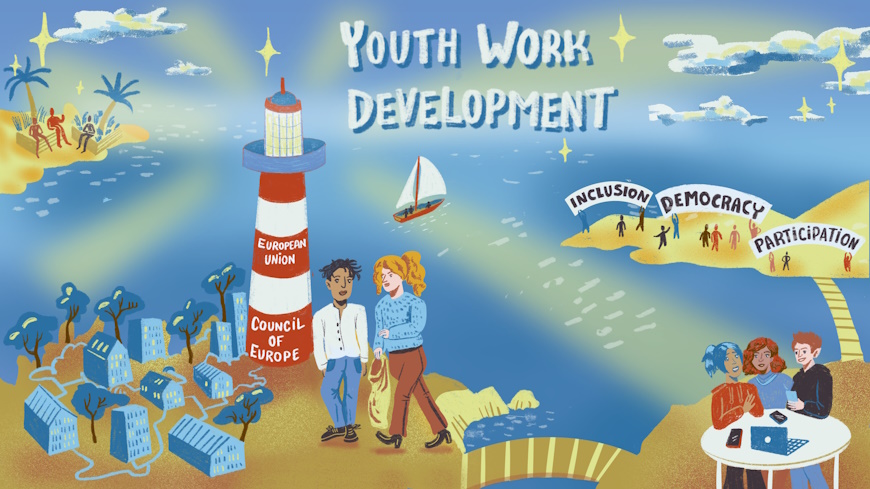From Bonn to Valletta: five years of youth work development in Europe
by Anna Sophie Diedrich
This article reflects on developments in Europe regarding European youth work since the 3rd European Youth Work Convention (2020) and slightly before, focusing on how the European Youth Work Agenda (EYWA) has been implemented across Europe in the current context.
 Youth work in a changing Europe
Youth work in a changing Europe
Europe in crisis: the Covid-19 pandemic forced societies into isolation and left a generation of young people disconnected from their everyday life. Just as countries began to reopen, Russia’s full-scale invasion of Ukraine sent shockwaves through the continent. Alongside these global shifts, democratic backsliding in Europe, artificial intelligence is transforming how we live and work and climate anxiety has taken root in the daily lives of people. Meanwhile, the growing cost-of-living crisis and youth unemployment (Eurostat, 2025) have added more uncertainty, not only economically but also emotionally, as mental health concerns among youth have drastically increased since the pandemic (EPRS 2024; Mental Health Europe 2025). In this context, young people across Europe are not only confronted with profound uncertainty, changes and impacts but are also expected to navigate the social, political and economic implications of these transformations.
Youth work and youth workers are both affected by and must respond to these crises. Lockdowns disrupted youth work across the continent, pushing many activities online and forcing youth workers to adapt their practices. In the face of climate anxiety and democratic backsliding, youth workers continue to create room for participation, dialogue and critical reflection and spaces for solidarity and support. Across Europe, they have taken on roles as educators, listeners and advocates often under growing pressure and with limited resources. Yet these demands have also sparked momentum.
The youth sector has identified youth work as a powerful force in fostering democratic values, active citizenship and societal advancement. Through youth work, young people can be supported and empowered to take an active part in societies and become agents of change. Youth work is an essential democracy standard and relevant pillar of the Council of Europe’s Youth Sector Strategy promoting democracy, human rights, and the rule of law.
As the 4th European Youth Work Convention in Valletta comes closer, it is time to reflect: : on how youth work has developed and what the next steps forward are.
 The European Youth Work Agenda
The European Youth Work Agenda
Since the 3rd European Youth Work Convention in 2020, Europe has faced profound challenges. However, youth work has also taken important steps forward as it marked the launch of the European Youth Work Agenda (EYWA): a long-term, practical effort to strengthen and further develop youth work across Europe.
The European Youth Work Agenda aims to establish a common European framework to advance youth work. It encourages countries, regions, organisations, and individual youth workers to take action: to improve the recognition of youth work, enhance the quality of training and education, and build better cooperation at all levels.
At its core, the implementation of the European Youth Work Agenda seeks to bridge the gap between policy and practice. It recognises that youth work thrives when rooted in local realities but it also acknowledges the need for shared standards, mutual learning and collective ambition.
The Final Declaration of the 3rd convention called on all stakeholders to take responsibility for the development of youth work. Not only in the youth work community of practices, but also beyond sectors for effective cross-sectoral co-operation, ensuring that youth work is recognised as an important contributor to societal development. While challenges remain, the objective for continued efforts to strengthen youth work in Europe remains clear, ensuring that youth work will continue to adapt to the evolving needs of young people.
 European developments: policy into action
European developments: policy into action
In 2017, the first Europe-wide policy document on youth work, Recommendation CM/Rec(2017)4 on youth work, was adopted by the Committee of Ministers of the Council of Europe to ensure that member states develop and implement their policies on youth work, and to advise them on possible strategies and legislation. The Council of Europe’s Recommendation is a key factor in the establishment of the European Youth Work Agenda. The recognition of youth work is a central priority of the Council of Europe’s Youth Sector Strategy 2030. In line with the European Youth Work Agenda, this strategy aims to further strengthen and develop youth work practices and policies, shaping youth work development in Europe.
In 2022, five years after its implementation, Recommendation CM/Rec(2017)4 on youth work was reviewed by the Council of Europe Joint Council on Youth (CMJ) to assess its impact, according to the roadmap (CM/Rec(2017)4 Roadmap). The recommendation had a significant impact as it established youth work as a stand-alone field of action, not merely an integral part of youth policy but as a policy field in its own right. In doing so, it also set a political standard for further youth work developments. It has also influenced the development of national youth work policies in member states, serving as a key guideline, especially for member states where youth work systems are emerging (CMJ Drafting Group, 2023).
In the youth policy field of the Council of Europe, the recommendation also acted as a uniting factor within a political framework, integrating various initiatives and activities (such as the Quality Label for Youth Centres and the Youth Work Portfolio). It established a common ground for co-operation within the youth work sector, advancing the political recognition of the youth work community of practice.
Across Europe, the European Youth Work Agenda has inspired a wide range of actions from digital innovations to structural reforms. What unites these efforts is a clear ambition: to make youth work more visible, more interconnected, and responsive to the realities young people face today. As we approach Valletta, this collective momentum offers a solid foundation for the next phase of growth and cooperation in European youth work.
 Looking ahead to Valletta
Looking ahead to Valletta
In 2025, the 4th European Youth Work Convention (27 to 30 May) will be hosted in Valletta by the government of Malta, through Malta’s National Youth Agency (Aġenzija Żgħażagħ) and the European Union Program Agency. The 4th European Youth Work Convention will enable the youth work sector to advance further under the theme “Youth Work Xcelerate”, capturing the spirit of momentum and reflection. With Europe still facing uncertainty and transformation, youth work has proven to be a stabilising and empowering force that needs to be advanced. Youth work is a powerful contribution to democracy for empowering young people, fostering inclusion, encouraging active participation and advancing citizenship education.
The European Youth Work Convention offers not just a space to assess but also to think together and shape what comes next. With everyone involved, representing a youth organisation, national youth council or international youth organisation, as a youth worker, policymaker, trainer, researcher, or young person, your voice and action matter. As we move from Bonn to Valletta, the question is not only “what has happened?” but also: What kind of youth work does Europe need for the next decade and what kind of Europe do we need for democratic youth work to thrive?
 Sources:
Sources:
3rd European Youth Work Convention (2020) Final Declaration – Signposts for the future. Bonn: 3rd European Youth Work Convention. Available at: https://www.coe.int/en/web/youth/review-process (Last accessed: 28 April 2025).
CMJ Drafting Group (Council of Europe Joint Council on Youth) (2023) Final report: Review on the implementation of Recommendation CM/Rec(2017)4 on youth work. Prepared by the CMJ drafting group based on research by Garcia López, M. A. and Hofmann-van de Poll, F. Strasbourg: Council of Europe. Available at: https://www.coe.int/en/web/youth/review-process (Last accessed: 23 Mai 2025).
Council of Europe (2020) Resolution CM/Res(2020)2 on the Council of Europe youth sector strategy 2030. Adopted by the Committee of Ministers on 22 January 2020 at the 1365th meeting of the Ministers' Deputies. Strasbourg: Council of Europe. Available at: https://www.coe.int/en/web/youth/youth-strategy-2030 (Last accessed: 23 Mai 2025).
Council of Europe Committee of Ministers (2017) Recommendation CM/Rec(2017)4 of the Committee of Ministers to member States on youth work. Adopted 31 May 2017 at the 1287th meeting of the Ministers’ Deputies. Strasbourg: Council of Europe. Available at: https://www.coe.int/en/web/youth/-/recommendation-on-youth-work (Last accessed: 23 Mai 2025).
Eurostat (2025). Youth unemployment. https://ec.europa.eu/eurostat/statistics-explained/index.php?title=Unemployment_statistics#Youth_unemployment (Accessed 28.4.2025)
EPRS (2024). World Mental Health Day 2024: 10 October. https://www.europarl.europa.eu/thinktank/en/document/EPRS_ATA(2024)762422 (Accessed 25.4.2025)
Mental Health Europe (2025). Mental Health Europe summary – Silent crisis: the mental health of Europe’s youth. https://www.mentalhealtheurope.org/mental-health-europe-summary-silent-crisis-the-mental-health-of-europes-youth/ (Accessed 25.4.2025)



